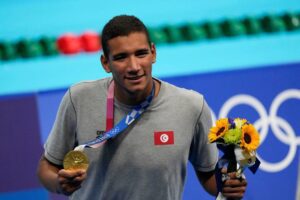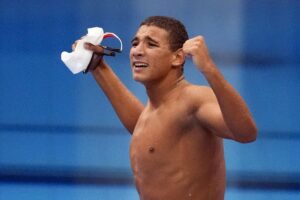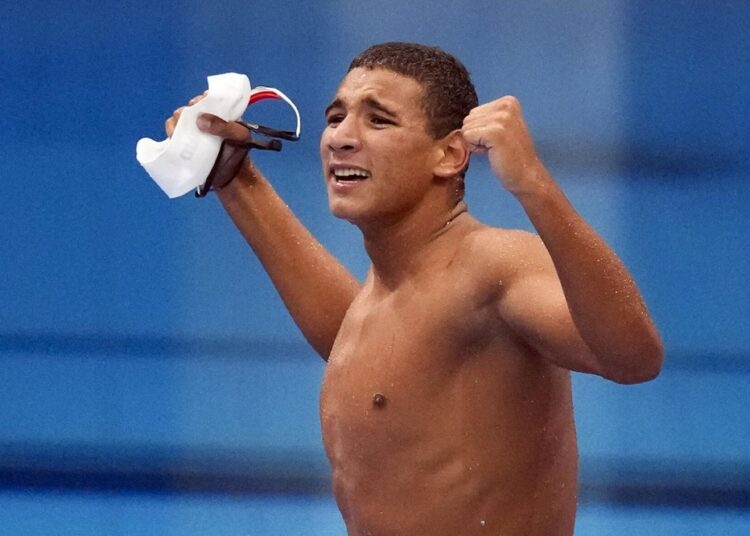TOKYO – Tunisia’s Ahmed Hafnaoui was so shocked to see his name in the gold medal position for the 400m freestyle on Sunday he did not believe his eyes but after letting his stunning win at the Tokyo Olympics sink in he said he hoped to have made his family proud.
Hafnaoui was the stunning winner of the 400-meter freestyle at the Tokyo Games on Sunday, beating a field of faster and older swimmers. The 18-year-old finished in 3 minutes, 43.26 seconds, punctuating his victory with loud yelling that echoed in the mostly empty 15,000-seat arena.
“I believe when I touched the wall and I saw myself first,” he said. “I was so surprised.”

Australia’s Jack McLoughlin earned silver and American Kieran Smith took bronze. The top three were separated by less than a second after the eight-lap race. “When I hit the water, I was just thinking about the medal, not the time,” Hafnaoui said according to AP.
He squeaked into the final by 14-hundredths of a second, landing him in the far outside lane. The fastest qualifiers were in the middle of the pool, without the ability to track Hafnaoui during the race.
Asked what he knew about Hafnaoui, Smith said, “Absolutely nothing.”
Hafnaoui made sure he’ll be remembered with a performance that boosted his resume considerably.
He joined Ous Mellouli as the only Tunisians to win a gold in swimming. Mellouli won the 1,500 freestyle at the 2008 Beijing Games, one of his three career Olympic medals. He reached out with a good-luck message to the teenager before the race. “I wish to be like him one day,” Hafnaoui said.
The teen who trains in the capital of Tunis is the North Africa country’s fourth Olympic gold medalist. He’s the second-youngest athlete from an African nation to win a swimming gold; Joan Harrison of South Africa was 16 when she won the 100 backstroke at the 1952 Helsinki Games.

Standing on the podium, his coach furiously pumping his arms in triumph in the stands, the moment was overwhelming for Hafnaoui.
“I was in tears because when I see the flag of my country and I hear the anthem in the background, it was great,” he said. “I’m so proud of it. I dedicate it to all the Tunisian people.”
Australia takes 3rd 4x100m gold
Australia won the 4×100 women’s freestyle relay Olympic gold for the third time in a row, beating their own world record and helping take the sting out of a disappointing first day of finals in the pool, Reuters reported.
The quartet of sisters Bronte and Cate Campbell, Meg Harris and Emma McKeon took 0.36 seconds off their previous best of 3:30.05 set in April 2018, with a world record of 3:29.69.
Canada took silver, 3:09 seconds behind the winners while the United States came in third for the bronze medal.
Ecstatic with their performance, team members made a show of presenting their gold medals to each other after the ceremony.
“We all just presented the medals between ourselves because it was a pretty special moment,” said Bronte Campbell.
“Because it is really all about the team and all of us supporting each other and competing with each other and therefore making each other stronger,” she said.
Emma McKeon propelled the team to victory with a 51.35-second third leg that was the fifth quickest women’s 100m split in history, an hour after she had qualified as the third fastest for the 100m butterfly final.
“As I watched Cate come in, I only just realised we got the world record, I thought it was just the Olympic record, so I was over the moon with that,” said McKeon.
Cate Campbell has featured in all three of the relay victories.
Earlier, Brendon Smith and Jack McLoughlin grabbed Australia’s first medals for the Tokyo 2020 Olympics, but there was no gold for them.
McLoughlin took silver behind Tunisian teenager Ahmed Hafnaoui who stormed in on the last lap to win the men’s 400m freestyle final in the biggest upset of the Olympics so far.
Smith became the first Australian to win a medal in the men’s 400m individual medley since 1984, coming in third behind American duo Chase Kallisz and Jay Litherland
On the women’s relay team, it was a bittersweet moment for Bronte Campbell, who at the age of a little over 29 is the oldest Australian woman to win an Olympic medal.






Discussion about this post